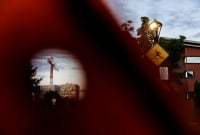It was not the 100,000-person strong Vancouver climate strike of 2019. But on Friday, a few thousand people took to Vancouver streets demanding stronger climate action. The march of families, students, teachers, elders, youth, advocates and activists, marked by a spirit of celebration and defiance, was one of many occurring across Canada and around the world this month.
The Vancouver event had three central demands:
- Stop new oil and gas projects today;
- Keep gas out of new buildings; and
- Protect people, nature, and Indigenous rights.
The march started at Vancouver City Hall, where high school student Delara Reporter, one of the event organizers, told the assembled crowd, “I’m here to tell you that we are tired. Tired of the excuses, tired of the lies, tired of being ignored. We will not stand for it and we will not be silent.”
Standing outside the building where the right-wing dominated city council recently voted to rescind the city’s nation-leading ban on fossil fuels for heating new buildings, Reporter declared, “To those [councillors] who are the reason why we've moved backwards, take a long hard look at yourself in the mirror. Will you be able to look your kids, nieces, nephews, or grandchildren in the eyes and say ‘I was part of the solution’ or will you be apologizing for not acting sooner once we're past the point of no return.”

At the Art Gallery, the rally was welcomed by Sun Dance Chief Rueben George of the Tsleil-Waututh Nation, one of the leaders of the movement to oppose the Trans Mountain Pipeline expansion, who urged those assembled to lean into their power and to not give up.
The crowd heard from Dogwood fossil gas campaigner Ashley Zarbatany, who grew up in North-East B.C., from where the province extracts so-called “natural” gas. “The B.C. government needs to stop treating the Peace River region like a sacrifice zone and give people the same environmental protections and economic opportunities up there that people have down here [in the Lower Mainland].” Zarbatany told those assembled. “Most workers would rather not have to participate in an industry that is poisoning their community and fueling climate change. But they have been given zero options or opportunities to do anything else. Many feel trapped… We need to invest in better options for the North. We can’t afford to leave them behind.”
“We know we’re in a climate emergency and we need to act quickly,” said Zarbatany. “We can’t afford not to… In 2021 alone we spent $12 billion dollars cleaning up climate disasters. We can’t afford climate change. And we definitely cannot afford another fracked gas pipeline like the one that the Gitanyow Nation is actively blockading on their territory as we speak.”
The rally was also treated to a special appearance by British folk-rocker Billy Bragg, in town for a concert that night, who shared a couple tunes with the crowd, including his climate-themed song King Tide.
Coming the day before the B.C. election writ dropped, the rally was also a chance for those assembled to signal to those seeking office that they still see climate as an urgent and high-priority electoral issue.
There is no doubt the climate movement has struggled to regain the pre-pandemic mass momentum of 2019, when real victories seemed near at hand. As climate-induced extreme weather events escalate and temperature records are shattered, and as more and more climate activists wrestle with loss and anxiety, the mood of the crowd this week was more subdued. Nevertheless, the temperament of the 2024 climate strike was more one of celebration than grief.
Why are today’s climate strike numbers a mere fraction of what they were in 2019? According to the folks at Dogwood, “The pandemic forced the climate community to put the brakes on in-person organizing, and it’s taking awhile for some of us to get back into the groove. It could also be that marches feel less impactful as we continue to see governments, swayed by oil and gas lobbyists, approving fossil fuel projects.”
Unlike 2019, this year’s climate strike will not have those in power quaking in their boots. But maybe that’s not what participants most needed right now. A key value of such rallies is to break through feelings of isolation. At a time when the disconnect between our politics and the reality of the climate crisis has never been more stark, the crowd was large enough to show those in attendance that they are not alone in their outrage or in harboring the view that we are in trouble.







Comments
And for exactly the same reasons, we will march again in the streets of Montreal on September 27
Encouraging news. We should all be outraged at the lack of progress on Climate Change. Thank you to these young folks!
"At a time when the disconnect between our politics and the climate crisis has never been more stark" isn't it obvious that the thrust of the campaign has to change now?
Isn't it as simple as ABC, ANYTHING BUT CONSERVATIVES.
Clearly, the customary academic distance from politics is a narcissistic indulgence we can no longer afford.
And why in hell are all these young people (particularly at the university level where context is supposedly a feature) so intensely and obliviously focused on the persistent, intractable mess in GAZA INSTEAD of climate change?
Sporting all those black and white scarves.....pffffttttt